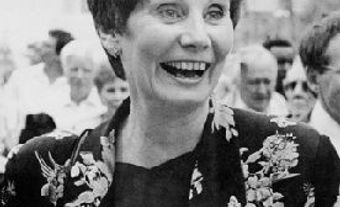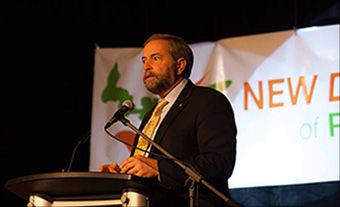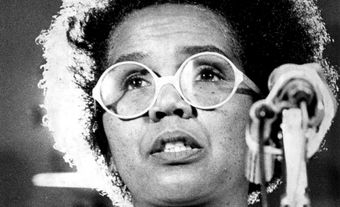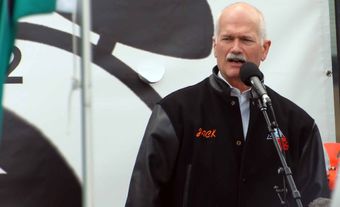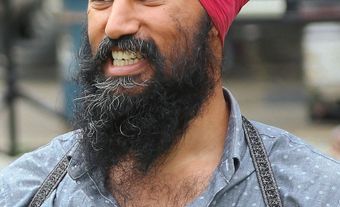John Edward Broadbent, CC, PC, politician, academic, Member of Parliament 1968–89 and 2004–06, leader of the New Democratic Party 1975–1989 (born 21 March 1936 in Oshawa, ON; died 11 January 2024 in Ottawa, ON). Ed Broadbent was a political science professor before he entered politics as a democratic socialist. He served as a New Democratic Party (NDP) Member of Parliament (MP) for 23 years. He was the leader of the NDP through four elections between 1975 and 1989. He was also president of the International Centre for Human Rights and Democratic Development and founded the Broadbent Institute, a progressive think tank. Recognized as a “giant” in Canadian politics and “a fierce champion for ordinary Canadians,” Broadbent was made a Companion of the Order of Canada in 2001.

Early Life and Career
Ed Broadbent was the second of three children born to a family of middle-class auto workers in a company town. His father, who worked at General Motors, and his homemaker mother were staunch conservatives.
Broadbent began showing an interest in politics in high school. In Grade 10, he wrote an essay arguing that Adlai Stevenson would make a better US president than Dwight Eisenhower. While an undergrad at the University of Toronto, Broadbent gravitated toward the work of 19th-century philosopher and politician John Stuart Mill, who called for the state to play a positive role in advancing the lives of its citizens.
After further studies at the London School of Economics, Broadbent returned to the University of Toronto, earning his PhD in 1966. Now identifying as a democratic socialist, he joined the political science department at York University in 1965.
Ed Broadbent in 1970
Ed Broadbent calls Trudeau smug.
(photo by Frank Lennon, courtesy Toronto Star via Getty Images)
New Democratic Party
Ed Broadbent was motivated to enter politics by the rise of new Liberal leader Pierre Trudeau in 1968. Broadbent saw Trudeau as a deceptively conservative politician and opposed his economic policies. In the 1968 election, Broadbent decided to run as a New Democratic Party (NDP) member in his childhood riding of Oshawa-Whitby, a Conservative stronghold. He won the seat by a tiny margin and went on to represent the riding for more than two decades.
In his early years as a Member of Parliament (MP), Ed Broadbent was identified with the party's left wing. Unsuccessful in his first attempt to win the leadership in 1971, he became a serious contender in 1974 when party leader David Lewis lost his seat while Broadbent's own majority increased enormously. After some hesitation he again ran for the job and was elected in July 1975. As leader, he emphasized economic issues and helped the party recover from its disastrous 1974 defeat.

He was elected a vice-president of the Socialist International in 1978. In 1980–81, Broadbent faced a caucus revolt (centered in Saskatchewan) against his support for the patriation of Canada's Constitution. The party convention in 1981 endorsed his position, but some discontent remained. At the 1983 convention, Prairie delegates circulated a manifesto that was critical of Broadbent's leadership.
Although NDP support appeared to decline prior to the 1984 election, Broadbent waged a brilliant campaign, emphasizing tax reforms, lower interest rates and equality for women. The NDP emerged with 30 seats, only 10 fewer than the Liberal Party, including 13 seats in Ontario. After the election, Broadbent's popularity in the polls was consistently ahead of Liberal leader John Turner and Prime Minister Brian Mulroney. (Mulroney later said that Broadbent “would have been prime minister if he had been leading any other party… I consider him a great parliamentarian and a major contributor to Canadian progress during the decade and a half we were together.”)
In the 1988 election, Broadbent led the NDP to a record 43 seats. Nonetheless, the Liberals made even greater gains and Mulroney’s Progressive Conservatives won a second mandate. Broadbent was criticized for not making opposition to the Canada-United States Free Trade Agreement (see NAFTA) the main issue in his campaign. His support for the Meech Lake Accord also caused some dissent within the party. In 1989, he resigned as leader and was replaced by Audrey McLaughlin.
Later Career
Ed Broadbent served as president of the International Centre for Human Rights and Democratic Development from 1990 to 1996. He also worked to address child poverty in Canada.
In 2004, federal NDP leader Jack Layton persuaded Broadbent to return to politics and run for a seat in the federal election. Broadbent did so in style, using an unaired bit from CBC’s This Hour Has 22 Minutes — in which he raps “I’ll melt the ice like a warm chinook, with social justice and a great left hook” — as his campaign commercial. Broadbent defeated the Liberal candidate and close ally of Paul Martin, Richard Mahoney, for the riding of Ottawa Centre.
As a member of the NDP shadow cabinet, Broadbent was the critic for democracy (parliamentary and electoral reform, corporate accountability and child poverty). In 2005, he announced that he would not seek re-election due to the health of his ailing wife, Lucille, who died in 2006. (See also Ed Broadbent, Interview.)
Still a force on the political scene, Broadbent teamed up with former Liberal prime minister Jean Chrétien in 2008 to negotiate the proposed Liberal-NDP coalition that sought to unseat the Stephen Harper government. The effort fizzled out after the governor general granted Harper’s request to prorogue Parliament in December of that year.
Broadbent Institute
In 2011, Ed Broadbent founded the Broadbent Institute, an Ottawa-based think tank that bills itself as “Canada’s leading progressive policy and training organization.” A guiding principle of the Institute is that “A market-based economy must not be allowed to produce a market-determined society. When there are conflicts between the human rights of people and the property rights of corporations, those of citizens must prevail.”
Through the Institute, Broadbent propagated what he called the Broadbent Principles for Canadian Social Democracy:
- Furthering economic, social and political rights.
- Creating a green economy.
- Understanding the transformative potential of electing social democratic governments responsive to robust social movements.
- Strengthening workplace democracy, including the right to a trade union and the fundamental role of the labour movement.
- Dismantling structural systems of oppression.
- Fully implementing the rights and title of Indigenous peoples and supporting their goal of achieving self-governance.
Personal Life
Ed Broadbent was married to his first wife, Toronto city planner Yvonne Yamaoka, from 1961 until their divorce in 1967. He was married to his second wife, Lucille Broadbent, from 1971 until her death from breast cancer in 2006. Together they adopted a daughter, Christine. In 2014, Broadbent married political theorist and historian Ellen Meiksins Wood, an old academic colleague of his. They were married until her death from cancer in January 2016.
Honours and Awards
Ed Broadbent was made a member of the Privy Council in 1982. He was named an Officer of the Order of Canada in 1993 and was promoted to Companion in 2001. In 2005, the Globe and Mail named him Nation Builder of the Year in recognition of his work on electoral reform and for emphasizing “a return to dignity and decency” in politics.
Following his death at the age of 87, Broadbent was widely celebrated as a “giant” in Canadian politics and “a fierce champion for ordinary Canadians.”
Honorary Degrees
- Honorary Degree, Dalhousie University (1990)
- Doctor of Laws, York University (1991)
- Doctor of Laws, Concordia University (1999)
- Doctor of Laws, Simon Fraser University (2000)
- Doctor of Laws, Carleton University (2009)
- Doctor of Laws, Queen’s University (2009)
- Doctor of Laws, Ryerson University (now Toronto Metropolitan University) (2009)
- Doctor of Laws, Ontario Tech University (2011)
- Doctor of Laws, Trent University (2013)

 Share on Facebook
Share on Facebook Share on X
Share on X Share by Email
Share by Email Share on Google Classroom
Share on Google Classroom
